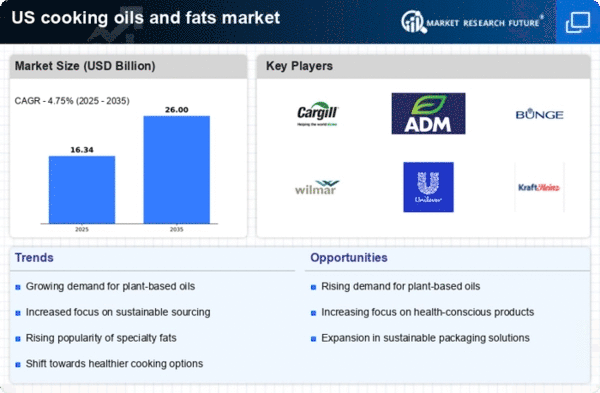Rising Demand for Plant-Based Oils
The cooking oils-fats market experiences a notable shift towards plant-based oils, driven by increasing consumer awareness regarding health and sustainability. In recent years, the market for plant-based oils, such as olive and avocado oil, has expanded significantly, with sales growth estimated at 15% annually. This trend reflects a broader movement towards healthier dietary choices, as consumers seek alternatives to traditional animal fats. The cooking oils-fats market is adapting to this demand by introducing innovative products that cater to health-conscious consumers. Furthermore, the rise of veganism and vegetarianism in the US has further propelled the demand for plant-based oils, indicating a potential long-term shift in consumer preferences. As a result, manufacturers are likely to invest in the development of new plant-based oil products to capture this growing segment.
Increased Focus on Sustainable Sourcing
Sustainability has become a critical factor influencing the cooking oils-fats market. Consumers are increasingly concerned about the environmental impact of their food choices, leading to a demand for sustainably sourced oils. This trend is reflected in the growing popularity of oils certified by organizations that promote sustainable agricultural practices. The cooking oils-fats market is responding by ensuring transparency in sourcing and production processes. For instance, the market has seen a rise in the availability of oils that are organic and non-GMO, appealing to environmentally conscious consumers. Reports indicate that products with sustainability certifications can command a price premium of up to 20%, suggesting that consumers are willing to pay more for products that align with their values. This focus on sustainability is likely to shape the future landscape of the cooking oils-fats market.
Health Regulations and Labeling Standards
Health regulations and labeling standards are increasingly shaping the cooking oils-fats market. As consumers become more informed about nutrition, regulatory bodies are implementing stricter guidelines regarding labeling and health claims. This shift is compelling manufacturers to reformulate products to meet these standards, ensuring transparency and accuracy in nutritional information. The cooking oils-fats market is adapting by investing in compliance measures and reformulating products to align with health regulations. For instance, oils with lower saturated fat content are being promoted more aggressively, as they meet consumer demand for healthier options. Additionally, the market is witnessing a rise in products that highlight specific health benefits, such as heart health or cholesterol management. This regulatory environment is likely to influence product development strategies and marketing approaches within the cooking oils-fats market.
Technological Advancements in Oil Extraction
Technological innovations in oil extraction processes are transforming the cooking oils-fats market. Advances such as cold-press extraction and supercritical CO2 extraction are enhancing the quality and yield of oils, making them more appealing to consumers. These methods not only preserve the nutritional value of the oils but also reduce the need for chemical solvents, aligning with health trends. The cooking oils-fats market is witnessing a shift towards these advanced extraction techniques, which can potentially increase production efficiency by 30%. As consumers become more discerning about the quality of oils, manufacturers are likely to adopt these technologies to meet rising expectations. This trend indicates a potential competitive advantage for companies that invest in innovative extraction methods, positioning them favorably in the evolving market landscape.
Growing Popularity of Ethnic and Specialty Oils
The cooking oils-fats market is experiencing a surge in demand for ethnic and specialty oils, driven by the increasing diversity of the US population and the growing interest in global cuisines. Oils such as sesame, coconut, and grapeseed are gaining traction as consumers seek to explore new flavors and cooking techniques. This trend is reflected in market data, which shows that specialty oils have seen a growth rate of approximately 12% over the past few years. The cooking oils-fats market is responding by expanding product lines to include a wider variety of oils that cater to these culinary preferences. Retailers are also capitalizing on this trend by offering cooking classes and recipes that highlight the use of these oils, further driving consumer interest. This growing popularity suggests a potential for sustained growth in the specialty oils segment.
















